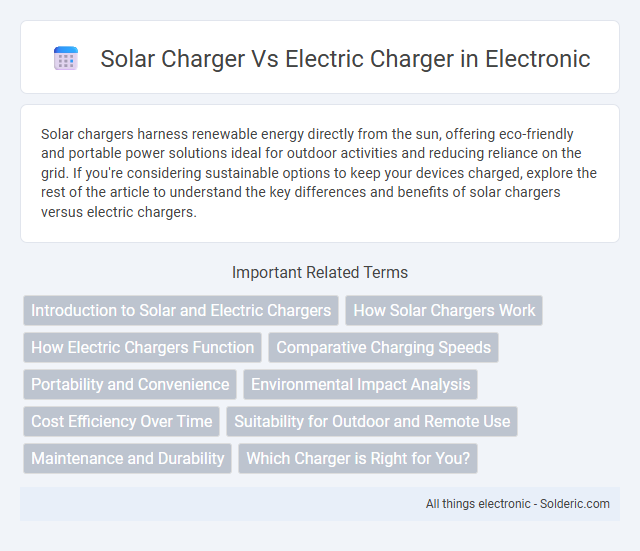Solar chargers harness renewable energy directly from the sun, offering eco-friendly and portable power solutions ideal for outdoor activities and reducing reliance on the grid. If you're considering sustainable options to keep your devices charged, explore the rest of the article to understand the key differences and benefits of solar chargers versus electric chargers.
Comparison Table
| Feature | Solar Charger | Electric Charger |
|---|---|---|
| Energy Source | Sunlight (Renewable) | Electric Grid (Non-renewable or renewable) |
| Charging Speed | Slow to Moderate (dependent on sunlight) | Fast to Very Fast (varies by charger type) |
| Portability | High (portable, lightweight options available) | Low to Medium (stationary or less portable) |
| Cost | Moderate initial cost, no electricity cost | Varies (low to high), ongoing electricity cost |
| Environmental Impact | Minimal, uses clean solar energy | Depends on electricity source, possible emissions |
| Usage Dependency | Requires sunlight availability | Requires access to electric outlet |
| Maintenance | Low maintenance, occasional cleaning | Low to moderate, depending on charger type |
Introduction to Solar and Electric Chargers
Solar chargers harness sunlight through photovoltaic cells to convert solar energy into electrical power, offering a renewable and eco-friendly way to charge devices. Electric chargers rely on grid electricity, providing consistent and faster charging speeds suitable for various applications, including smartphones, laptops, and electric vehicles. Understanding the differences helps you choose the most efficient and sustainable charging solution for your needs.
How Solar Chargers Work
Solar chargers convert sunlight into electrical energy using photovoltaic cells that capture solar radiation and generate direct current (DC). This DC power is then regulated and stored in batteries or directly used to charge electronic devices. Unlike electric chargers that rely on grid electricity, solar chargers provide a sustainable and portable energy source by harnessing renewable solar power.
How Electric Chargers Function
Electric chargers function by converting alternating current (AC) from the power grid into direct current (DC) to replenish electric vehicle (EV) batteries efficiently. They employ onboard or external power electronics to manage voltage and current levels, ensuring safe and optimal charging rates that protect battery health. Advanced electric chargers also integrate smart features like communication protocols and energy management systems to optimize charging based on grid demand and user preferences.
Comparative Charging Speeds
Solar chargers typically offer slower charging speeds due to reliance on sunlight intensity and panel efficiency, often delivering between 5 to 20 watts of power. Electric chargers, especially Level 2 and fast chargers, provide significantly faster charging rates, ranging from 3.3 kW to over 350 kW, enabling rapid battery replenishment within minutes to hours. The substantial difference in charging speeds makes electric chargers more suitable for everyday vehicle use, while solar chargers serve as sustainable supplemental options in off-grid or eco-friendly scenarios.
Portability and Convenience
Solar chargers offer superior portability and convenience due to their lightweight design and ability to harness renewable energy anywhere with sunlight, making them ideal for outdoor activities and remote locations. Electric chargers typically require access to a power outlet, limiting their use to stationary environments such as homes, offices, or charging stations. The independence from grid power makes solar chargers a practical choice for users seeking mobility and eco-friendly energy solutions.
Environmental Impact Analysis
Solar chargers significantly reduce carbon emissions by harnessing renewable energy from the sun, making them an eco-friendly alternative to electric chargers that often rely on electricity generated from fossil fuels. The production and disposal of electric chargers contribute to electronic waste and environmental pollution, whereas solar chargers typically have a longer lifespan and lower environmental footprint. Life cycle assessments consistently show that solar chargers have superior sustainability metrics due to minimal greenhouse gas emissions and reduced dependency on non-renewable energy sources.
Cost Efficiency Over Time
Solar chargers offer significant cost savings over time by harnessing free energy from sunlight, reducing reliance on electricity bills and eliminating fuel expenses. Electric chargers require ongoing electricity costs that fluctuate with energy prices and may increase total expenses over long-term use. Investing in solar chargers can provide a more economical solution, especially in regions with abundant sunlight and high electricity rates.
Suitability for Outdoor and Remote Use
Solar chargers excel in outdoor and remote use by harnessing sunlight, providing a renewable energy source without dependency on electrical outlets, making them ideal for camping or hiking trips. Electric chargers require access to power grids, limiting their effectiveness in isolated locations but offering faster charging speeds for your devices when plugged in. Choosing between the two depends on the availability of sunlight and your need for portability and convenience in remote environments.
Maintenance and Durability
Solar chargers require minimal maintenance, mainly keeping the panels clean and ensuring proper exposure to sunlight, which enhances their durability since they have no moving parts. Electric chargers, while generally robust, may need periodic inspections of cables, connectors, and internal electronics to maintain optimal function and prevent wear. Both types offer long-lasting performance when maintained properly, but solar chargers provide greater resilience in outdoor and off-grid conditions.
Which Charger is Right for You?
Choosing between a solar charger and an electric charger depends on your lifestyle, energy needs, and environmental priorities. Solar chargers offer renewable energy and portability, ideal for outdoor activities and off-grid use, while electric chargers provide faster, more consistent power suited for everyday use and high-demand devices. Assessing your charging frequency, location, and commitment to sustainability will help determine the most efficient and practical option.
Solar charger vs Electric charger Infographic

 solderic.com
solderic.com